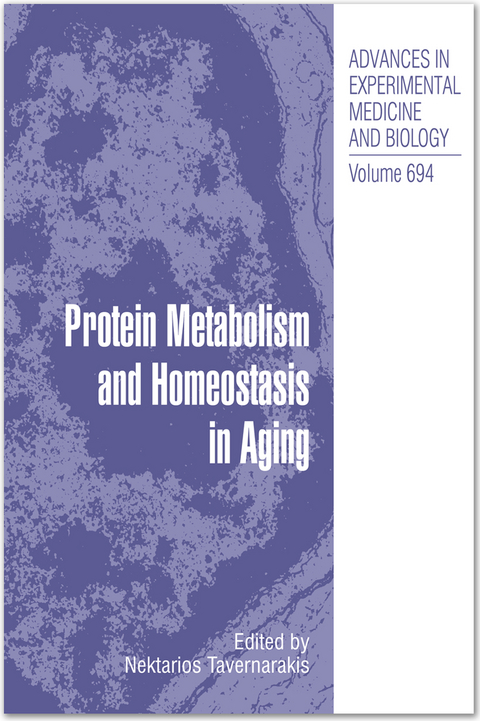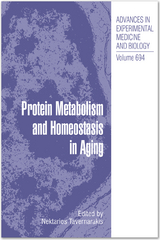Protein Metabolism and Homeostasis in Aging
Springer-Verlag New York Inc.
978-1-4419-7001-5 (ISBN)
Nektarios Tavernarakis is a Research Director (Professor) at the Institute of Molecular Biology and Biotechnology, in Heraklion, Crete, Greece, heading the Caenorhabditis elegans molecular genetics laboratory. He earned his PhD degree at the University of Crete, studying gene expression regulation in yeast, and trained in C. elegans genetics and molecular biology at Rutgers University, New Jersey, USA. His research focuses on studies of neuronal function and dysfunction, using the nematode Caenorhabditis elegans as a model organism. His main interests are the molecular mechanisms of necrotic cell death in neurodegeneration and senescent decline, the molecular mechanisms of sensory transduction and integration by the nervous system, the interplay between cellular metabolism and aging, and the development of novel genetic tools for C. elegans research. He is the recipient of a European Research Council (ERC ) Advanced Investigator grant award, a European Molecular Biology Organisation (EMBO) Young Investigator award, an International Human Frontier in Science Program Organization (HF SPO) long‑term award, the Bodossaki Foundation Scientific Prize for Medicine and Biology, the Alexander von Humboldt Foundation, Friedrich Wilhelm Bessel research award, and is member of EMBO.
Synthesis, Modification and Turnover of Proteins during Aging.- Regulation of mRNA Translation as a Conserved Mechanism of Longevity Control.- Protein Synthesis and the Antagonistic Pleiotropy Hypothesis of Aging.- Proteasome Function Determines Cellular Homeostasis and the Rate of Aging.- Autophagy and Longevity: Lessons from C. elegans.- Autophagy and Aging: Lessons from Progeria Models.- Regulation of Protein Turnover by Longevity Pathways.- Protein Metabolism and Lifespan in Caenorhabditis elegans.- Mitochondrial Protein Quality Control Systems in Aging and Disease.- p38MAPK in the Senescence of Human and Murine Fibroblasts.- Protein Homeostasis in Models of Aging and Age-Related Conformational Disease.- Roles for SUMO Modification during Senescence.- Post-Translational Modification of Cellular Proteins by Ubiquitin and Ubiquitin-Like Molecules: Role in Cellular Senescence and Aging.- Sensory Influence on Homeostasis and Lifespan: Molecules and Circuits.- Regulation of Muscle Atrophy in Aging and Disease.- Confronting Cellular Heterogeneity in Studies of Protein Metabolism and Homeostasis in Aging Research.
| Reihe/Serie | Advances in Experimental Medicine and Biology ; 694 |
|---|---|
| Zusatzinfo | XXI, 249 p. |
| Verlagsort | New York, NY |
| Sprache | englisch |
| Themenwelt | Studium ► 1. Studienabschnitt (Vorklinik) ► Biochemie / Molekularbiologie |
| Studium ► 1. Studienabschnitt (Vorklinik) ► Histologie / Embryologie | |
| Studium ► 1. Studienabschnitt (Vorklinik) ► Physiologie | |
| Naturwissenschaften ► Biologie ► Biochemie | |
| Schlagworte | aging • homeostasis • Metabolism • Protein • Tavernarakis |
| ISBN-10 | 1-4419-7001-0 / 1441970010 |
| ISBN-13 | 978-1-4419-7001-5 / 9781441970015 |
| Zustand | Neuware |
| Informationen gemäß Produktsicherheitsverordnung (GPSR) | |
| Haben Sie eine Frage zum Produkt? |
aus dem Bereich




